Kombucha: The Best and Worst Brands
Kombucha was once a niche drink, that then surged in popularity during 2015-2020. Many manufacturers entered the market, but since then, many are missing-in-action, as the market become too crowded.
How do you choose the healthiest brand?
What is Kombucha?
If you’re new to the drink and are unsure what it is, kombucha is simply a fermented tea beverage.
Water, tea leaves, sugar, and a substance called SCOBY (Symbiotic Colony of Bacteria and Yeast) are what’s needed to make kombucha. The final product has a tea and slightly vinegary flavor that is also slightly fizzy.
Some brands try to minimize the vinegar flavor by adding sweetness and other ingredients like fruit juices and flavorings. Other brands don’t mask it, preferring to keep their kombucha more natural.
Is Kombucha healthy?
Kombucha provides probiotic benefits. When you drink kombucha, you consume billions of healthy gut microbes that help your digestive system keep working as it should.
I’ve read all kinds of health claims on the websites of kombucha brands, and some are a bit of a stretch.
When comparing kombucha brands, this is our number one consideration. Some brands are pasteurized, which kills the live cultures (and defeats the purpose of drinking kombucha for better health).
Brands do this to stop alcohol formation, which I’ll cover at the end of the article.
If you see “pasteurized” on a kombucha label, pick a different brand.
The best and worst Kombucha brands
For comparison, I’ve looked at one flavor from each brand and tried to choose “original” when possible. Other flavors may have slightly more or less calories, sugar, and caffeine.
Remedy
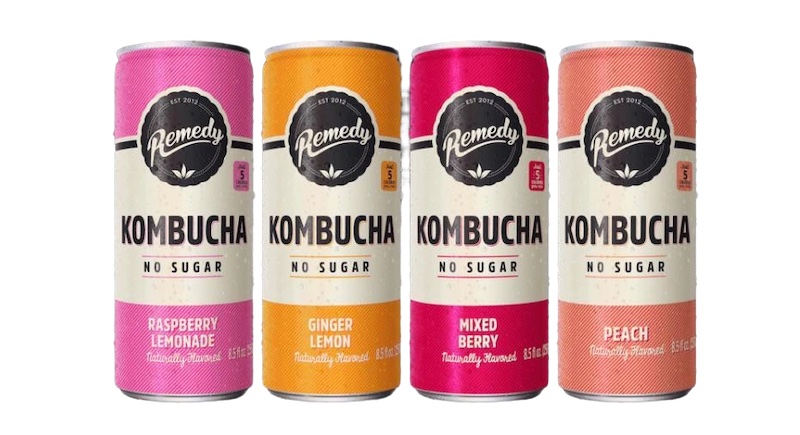
Remedy is among the post popular Kombucha drinks. Started in Melbourne in 2012, the drink is available worldwide.
- 5 calories per can
- Zero sugar
- 100% organic
- No artificial ingredients or preservatives.
Verdict: Remedy is very popular having a simplified product line of the flavors that people love.
Kevita Master Brew Kombucha
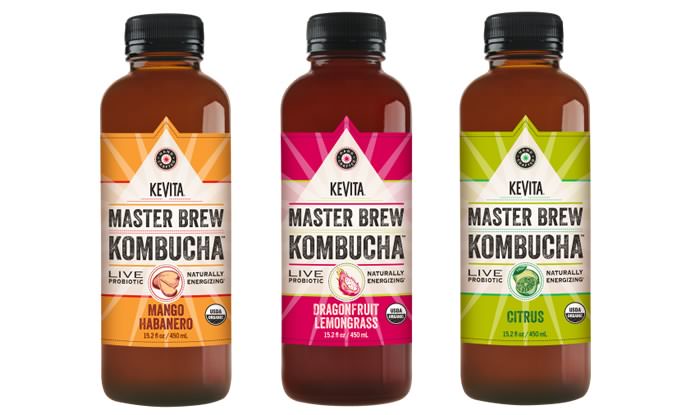
Ginger Flavor
- 4 billion CFUs of live probiotics
- 70 calories per bottle
- 16 grams of sugar
- 76 mg of caffeine
- Sweetness enhanced with stevia
- 100% organic
- No artificial ingredients or preservatives.
Verdict: This is a solid brand health-wise, but it may have too much caffeine for some. They increase the natural caffeine with green coffee bean extract.
Humm Kombucha
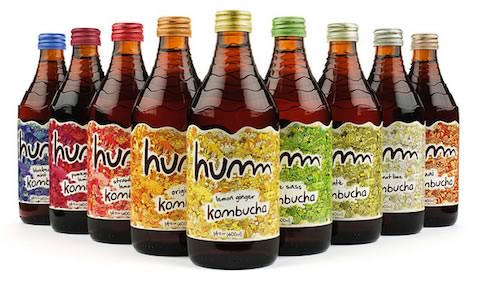
Lemon Ginger
- Number of live cultures unknown
- 72 calories per bottle
- 16 grams of sugar per bottle
- Caffeine amount unknown
- No artificial flavors or preservatives
Verdict: This brand ranges in sweetness depending on the flavor and other flavors contain more sugar. Humm is an all-natural brand with certified organic and alcohol-free flavors.
GT’s Enlightened Organic Raw Kombucha
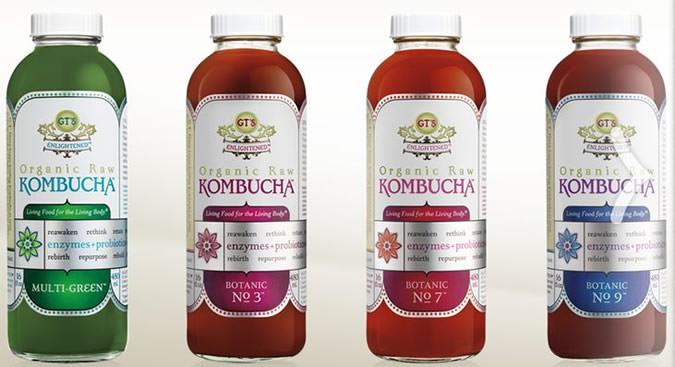
- 2 billion live cultures per bottle
- 50 calories per bottle
- 12 grams of sugar
- Caffeine amount unknown
- Certified organic
- No artificial ingredients or preservatives
Verdict: GT is a brand that appeals to those who like less-sweetened kombucha. They offer many flavors, and in GT’s case, the flavor doesn’t increase the sugar or calories as much as it tends to do in other brands.
Wonder Drink Prebiotic Kombucha
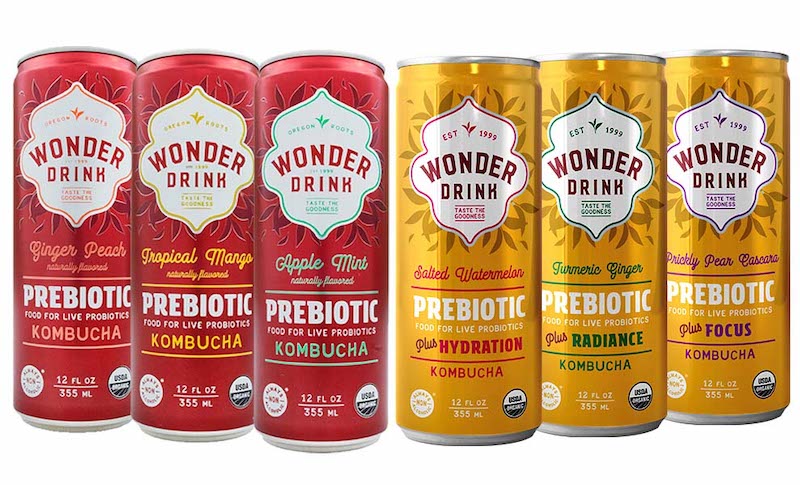
- No live cultures but an effective dose of prebiotic fiber per can.
- 50 or fewer calories per can.
- 8-10 grams of sugar per can.
- Caffeine content is 30-60 mg per can.
- Certified organic.
- No artificial ingredients or preservatives.
- Sweetness enhanced with Stevia.
Wonder Drink has been brewing kombucha since 1999. They are the first and only kombucha made with organic prebiotic fiber (called xylo-oligosaccharides, or “XOS” for short).
The Prebiotic Plus flavors have functional ingredients such as ashwagandha, electrolytes, sea buckthorn, and coffee cascara. This version needs to be refrigerated.
Brew Dr. Kombucha
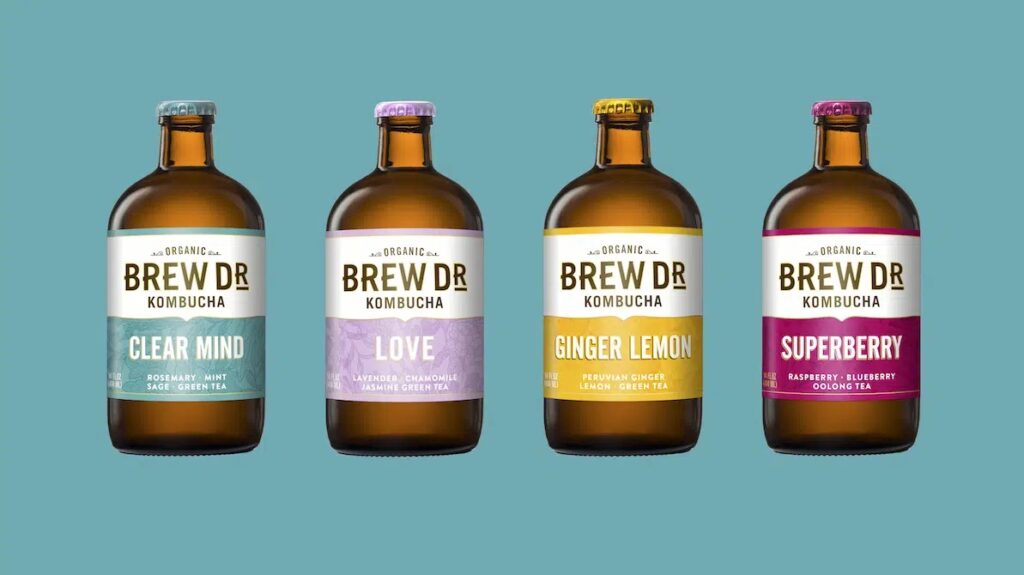
Clear Mind
- Billions of live cultures per bottle
- 50 calories per bottle
- 10 grams of sugar
- 15 mg of caffeine per bottle
- Certified organic
- No artificial ingredients or preservatives
Verdict: Dr. Brew is a 100% raw kombucha with simple ingredients and herbal flavorings. While they offer no straight-up tea flavor, the varieties they do offer are certainly interesting.
Health-Ade Kombucha
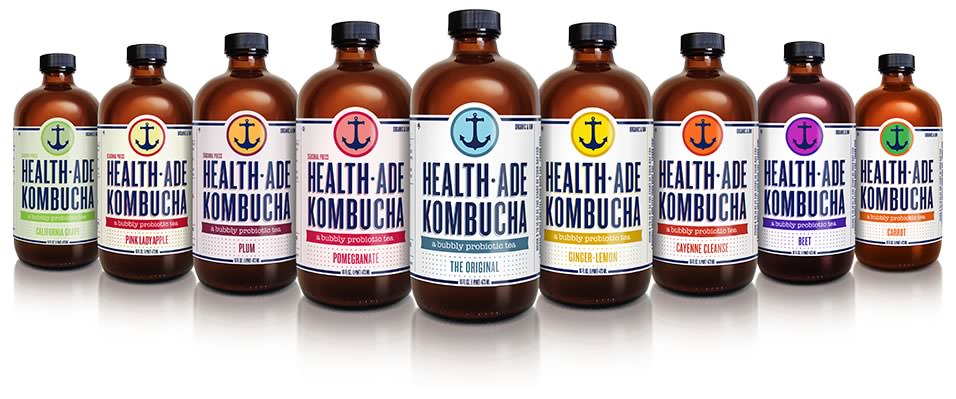
- Contains live cultures but an amount unknown
- 60 calories per bottle
- 12 grams of sugar
- Caffeine amount unknown
- Certified organic
- No artificial ingredients or preservatives
Verdict: Health-ade is another 100% raw kombucha with active cultures. It is low in sugar, and other varieties contain real fruit juice.
Rise Kombucha

- Live cultures but amount unknown
- 62 calories per bottle
- 14 grams of sugar per bottle
- 2-8mg of caffeine per bottle
- Certified organic
- No artificial ingredients or preservatives
Verdict: Rise is a Canadian brand and is 100% raw kombucha. It’s a tad higher in sugar than others, and they don’t offer just a traditional tea-flavored variety. This brand can contain visible pieces of SCOBY.
Ucha Kombucha (France)
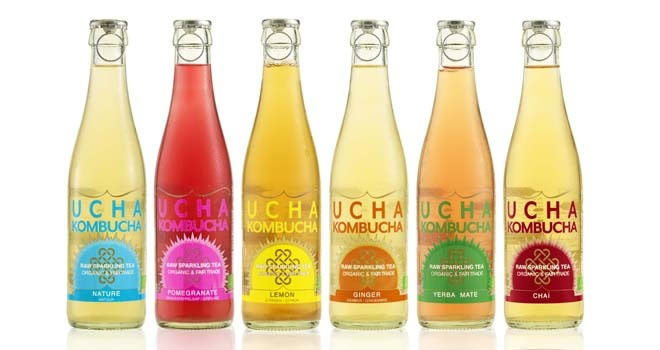
- Live cultures per bottle but amount unknown
- 25 calories per bottle
- 5 grams of sugar per bottle
- Caffeine per bottle unknown
- Certified organic
- No artificial ingredients or preservatives
Verdict: Ucha is a 100% raw brand of fermented tea available in Europe. It’s low in sugar and comes in several flavors as well as a yerba mate variety.
Unity Vibration (Michigan)
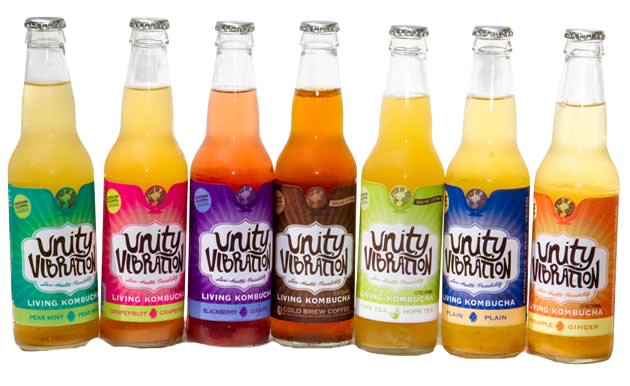
- Live cultures per bottle but amount unknown
- 105 calories per bottle
- 27 grams of sugar per bottle
- 86+ mg of caffeine per bottle in the cold-brew coffee flavor
- Not certified organic
- No artificial ingredients or preservatives
Verdict: Unity Vibration is a 100% raw kombucha classified as an alcoholic beverage because it contains more alcohol than the .5% limit. It’s one of the highest in sugar and only for those at least 21 years of age.
Does kombucha contain alcohol?
All 100% raw kombucha or fermented tea products contain alcohol.
Most are under 0.5% to avoid being classified as an alcoholic beverage. Under certain conditions, fermented tea products can continue to ferment after leaving the factory, increasing alcoholic content.
The only brands that would just contain zero or trace amounts of alcohol are the pasteurized ones, and these aren’t true kombucha and offer little, if any, health benefits.
Does kombucha contain caffeine, and how much?
Because most kombucha is made with traditional tea leaves, it will contain some caffeine. More if you make it yourself, less if it’s store-bought.
Generally, the caffeine is 15 mg or less per bottle. Brands that add coffee flavor or yerba mate will have more caffeine.
How to make kombucha
Brewing kombucha isn’t rocket science, and you can fairly easily make your own.
Amazon sells kits with everything you need, and once you have SCOBY, you can keep using it repeatedly.
This allows you to experiment with different flavors and ingredients and will save you a lot of money. However, fermentation always has a slight risk of contamination from undesirable microbes that could ruin the taste or even make you sick.
If you decide to make your own kombucha, follow the instructions and know what signs to look for that reveal a contaminated batch.
View article sourcesSources
- Marchesi, J. R., Adams, D. H., Fava, F., Hermes, G. D., Hirschfield, G. M., Hold, G., ... & Thomas, L. V. (2016). The gut microbiota and host health: a new clinical frontier. Gut, 65(2), 330-339. The study
- Quigley, E. M. (2013). Gut bacteria in health and disease. Gastroenterol hepatol (NY), 9(9), 560-569. The Study


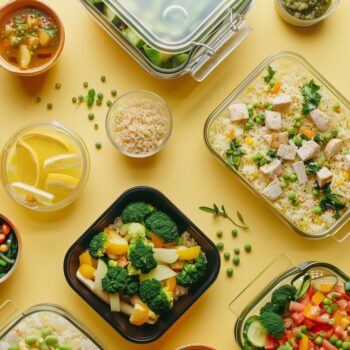 How to create macro meal plans (quickly) using ChatGPT
How to create macro meal plans (quickly) using ChatGPT Calorie Deficit Meal Planner
Calorie Deficit Meal Planner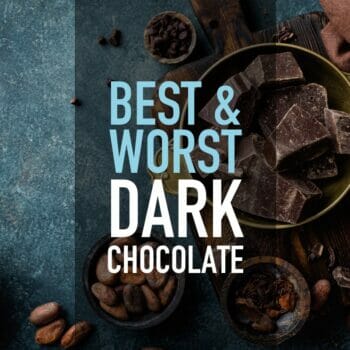 Dark Chocolate: The Best and Worst Brands
Dark Chocolate: The Best and Worst Brands Macro Friendly Family Dinners
Macro Friendly Family Dinners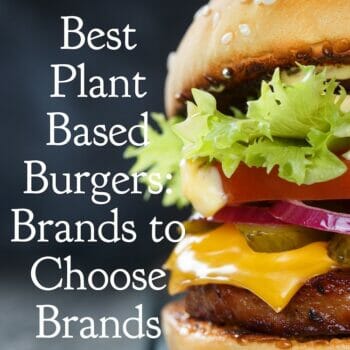 The Best Plant-Based Burgers: Brands to Choose and Avoid
The Best Plant-Based Burgers: Brands to Choose and Avoid